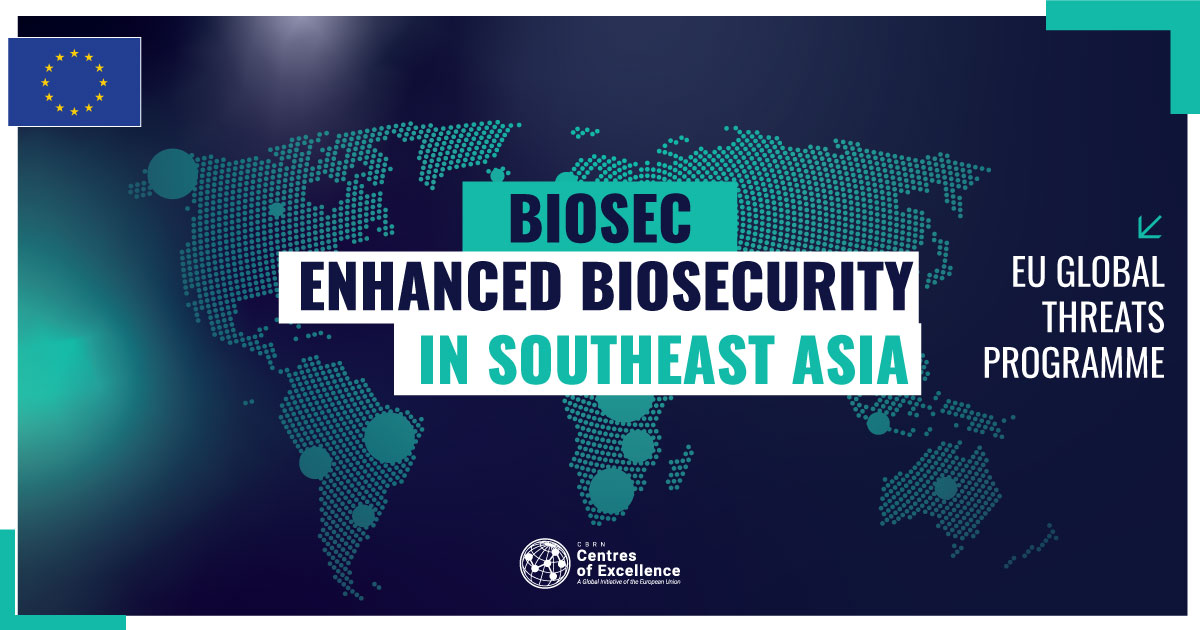
Context
Global infectious disease outbreaks are of increasing concern for the international community. Reactive surveillance systems with rapid detection capacities, close coordination between human and animal health authorities and efficient reporting to other key sectors are required to ensure a rapid and effective response. Also, the potential unauthorised acquisition, theft, transfer or intentional misuse of high-risk biological materials, especially pathogens, pests and biological toxins with dual-use possibilities, whether in relation to illicit trafficking, bioterrorism or agroterrorism need to be quickly tackled in the region.
Overall objective
This project aims to provide a set of recommendations for improving biosecurity management system in Southeast Asia with effective tools to enhance capabilities to respond to highly communicable diseases or global catastrophic biological events, such as pandemics.
Specific objectives
- To raise awareness on biosecurity and biosecurity risk management, crosscutting biological risks and dual-use high-risk biological materials.
- To review and contribute to the effective enforcement of national legislations and guidelines in compliance with relevant international obligations in the area of biosecurity.
- To increasestrength and effectiveness of border controls for detecting biological threats agents and improved regulatory controls covering the acquisition, use, storage and transfer of high-risk biological materials.
- To improve biological material control and accountability at high-risk biological laboratories.
- To improve lab-based capacity to detect and identify the type and source of disease-causing agents.
Concrete activities
- Workshops in all partner countries covering the issues mentioned above and specific suggestions for improved biosecurity.
- Establishment of a related working group in each partner country.
- Capacity building exercises and the training of national trainers in each partner country.
- Building national inventories of high-risk biological materials, dual-use research and technologies and information.
- The creation of a regional network of biological forensics experts and forensics institutions.
- Regional training and national laboratory-based training in each partner country.
Expected results
- Enhanced security framework mechanisms for ensuring physical security and information security related to high-risk biological material facilities for human, animal and plant health.
- Establishment of a workable framework for secure information exchange about biosecurity threats for human, animal and plant health.
Achievements
- 8 countries directly engaged with activities during the project, workshops requested by 6 countries.
- 2 regional workshops on Biosecurity held (Thailand and Vietnam) with the emphasis on Risk Assessment and the Management of infectious waste in human health and animal health settings and the development of regional networks.
- 277 delegates trained in laboratory Biosecurity in Brunei, Cambodia, Indonesia, Lao PDR, Thailand, Philippines and Viet Nam including a train the trainer component (60% Female/40% Male).
- 14 experts trained on biosecurity legal frameworks and codes of conduct for delegates from Brunei Darussalam, Cambodia, Indonesia, Lao PDR, Philippines, Singapore, Thailand and Viet Nam. Increased level of understanding of effective biosecurity legal frameworks in Brunei Darussalam, Cambodia, Lao PDR, Singapore and Thailand through legislative analysis.
- Support to the development of a Biorisk Code of Conduct in Singapore and sharing of Model Laws.
- 5 countries trained (Brunei, Cambodia, Lao PDR, Philippines and Thailand) in the design, implementation of exercises to test the enforcement of bio-security legislation particularly at border control points, including a Regional Workshop to test information sharing on biosecurity risks between all 9 participating countries with recommendations.
- Support to the development of National Inventories of Dangerous Pathogens (NIDPs) in Brunei, Cambodia, Lao PDR including installation of inventory software in Cambodia and Thailand.
- Production of Guidelines for Security Plans for facilities handling high-consequence pathogens in limited-resource settings.
- Development and sharing of a Surge Capacity Assessment Tool to support the rapid expansion of testing capacity during global pandemics or major regional outbreaks.
- Project duration
- 1 Nov 2019 - 31 Mar 2025
- Project locations
- BruneiCambodiaIndonesiaLaosMalaysiaPhilippinesSingaporeThailandVietnam
- Overall budget
- €3 800 000
- Threat area
- CBRN Risk Mitigation
